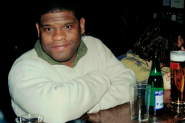John Wray: Method Writer
22. February 2010 15:26
An interview about Lowboy
“I’ve thought of each of my novels as comedies, in a certain sense. They’re easier to write if you don’t take them – or yourself – too seriously.”
Darran Anderson: First off, where did the inspiration for Lowboy come from?
John Wray: An Australian friend of mine showed me a clipping, years ago, about a man who’d escaped from a mental institution in Sydney – a well-liked man, but with a history of violence – who’d gone of his meds not long before. The manhunt had a particular urgency, because it was estimated that the medication would be out of his system entirely within 48 hours. At the risk of seeming exploitative, the situation struck me immediately as ideal material for a novel. I had two friends growing up who developed schizophrenia in their teenage years, but I wasn’t thinking of them when I began the book. They worked their way into it later, almost without my noticing.
DA: One of the major themes of Lowboy is the power of secrets – histories, intentions even names are all concealed. They’re so prevalent that it suggests that maybe it’s secrets, rather than fraternity or love, that accidentally binds society together. Like that old Lenny Bruce saying, “If white America told the truth for one day, it’s world would fall apart.” Would that be a fair assessment?
JW: Lenny Bruce was right. The unspoken has always been society’s binding agent. That holds true for all social units, from the most complex to the most basic. If I told my girlfriend every last thing I desired or thought, she’d in all probability have me locked away in some sort of hospice. And I consider myself a fairly normal guy.
DA: Your book takes a refreshingly honest and sympathetic approach to mental illness, was that a difficult balancing act? And once you put yourself inside a troubled mind is there a danger you’ll stay there a bit too long?
JW: What saved me from a lot of the pitfalls of writing about mental illness, I think, was less any particular agenda or approach to the issue itself than a general aversion to cliché. If you avoid all the short-cuts and laziness rampant in most depictions of schizophrenia (and in most fiction, in general, as far as that goes) you’ll spare yourself no end of grief.
To answer your second question: I actually felt quite at home in Lowboy’s consciousness, and not in any hurry to leave. Schizophrenia is hands-down the most fascinating subject I’ve ever delved into, and I still feel that I’ve only scratched the surface.
DA: You wrote the book on the New York trains where the book is set; how important was that to how the book turned out and was it a rewarding experience?
JW: There’s something a little silly to me now about the fact that I wrote my first draft on the subway, like some kind of 70’s method actor living on dried fish and hardtack to study the role of a pirate. It did have some unexpected advantages, though: no cellphone reception, no internet, and no office rent to pay. And of course I got a chance to observe a wide variety of interactions between people on the trains, although most of the time I had my headphones on and tried my best to ignore them. A good iTunes playlist was essential. Is there such a thing as product placement in interviews?
DA: The book touches on this whole inverted city beneath New York hidden away with it’s own hidden rivers, chambers, streets and inhabitants. There’s been a recent revival of interest in urban exploration, venturing down where only graffiti artist and homeless used to go. Have you been down there and off the map so to speak?
JW: I have, and I saw quite a few interesting things the gigantic, empty reservoir under Manhattan’s Bryant Park, for instance, or the off-limits Old City Hall subway station that I describe in the book – but for the most part my underground explorations were dark, dank, smelly and decidedly underwhelming. The best subterranean bits in Lowboy, for better or for worse, came straight out my addled brain.
DA: For your last novel Canaan’s Tongue you admirably avoided the traditional wine and cheese party book launch in favour of travelling down the Mississippi on a home-made raft, stopping for readings on your journey. It seems like either an act of lunacy or genius, how did it turn out?
JW: I’ve got nothing against wine and cheese, or parties, but a book tour is intended to sell books. I had the ridiculous notion that if I did something outlandish enough, people might pay attention to my novel. I’m not altogether sure whether it worked or not, but we sure had a great time on that little raft. It was like floating unhurriedly out to the ocean on a beer cooler. The name of the raft was ‘Donuts’, after my favorite Brooklyn diner. I think I’d like to have ‘Donuts’ engraved on my tombstone. That trip was one of the few really good ideas I’ve ever had.
DA: To touch on Canaan’s Tongue for a moment, in a way the book suggests that characters such as slave traders and half-mad preachers were as much pioneers and the architects of modern America as say Lincoln or Whitman was. It’s a pretty scary thought, would that be close to what you intended?
JW: I wrote Canaan’s Tongue during a time of absolute disgust with the state of my country, and there was no way to keep my state of mind out of the novel. From the beginning, I conceived of the book as an outlet for my anger, and it served its purpose surprisingly well. Obama’s election didn’t hurt, either.
DA: You wrote your earliest novel The Right Hand of Sleep (set in pre-Nazi Austria) whilst staying in a tent in a rundown Brooklyn basement; that seems like a challenge in itself, was it a difficult process?
JW: It was very difficult, at times – the space I was living in (a rehearsal space for some musicians I was friends with; the band Animal Collective now practices there) had no windows, no heat, no telephone, no shower – but whenever things got too bleak for me down there, I’d remind myself that I was living rent-free in one of the most expensive cities in the world, and I’d usually cheer up right away. That bunker of mine enabled me to work almost full-time on my first book, which might never have gotten written otherwise.
DA: Considering Lowboy’s apocalyptic leanings, are you hopeful about the future (global warming for one haunts the book) or are we all just fiddling while Rome burns?
JW: In much the same way that Canaan’s Tongue was an exorcism of my anger at the American military-industrial apparatus, Lowboy was begun in the hope of channeling my anxiety about climate change into something outside of myself, and thereby loosening its grip on me somewhat. I was having recurring nightmares about it at the time that I began the book, and they did, in fact, grow steadily less frequent as I worked. During daylight hours I’m still shitting my pants, however.
DA: You’ve spoken previously of your admiration for Stanley Kubrick, particularly in terms of his ability to move from genre to genre and seemingly master everything from psychological horror to satirical comedy. Given this, are you planning a complete shift in terms of your next book?
JW: I am, actually, thanks for asking. I’m about six months into my next project, and it’s turning out to be a different animal altogether, as usual. Bigger and rowdier and more anarchic and playful. It’s a bona-fide comedy, I suppose, though I’ve thought of each of my novels as comedies, in a certain sense. They’re easier to write if you don’t take them – or yourself – too seriously. On the other hand, I laugh at all the most inappropriate moments at dinner parties, too. Whatever you do, don’t invite me over.
March 20, 2009
Dogmatika





-6507dcf8af9e0_160x60.jpg)
